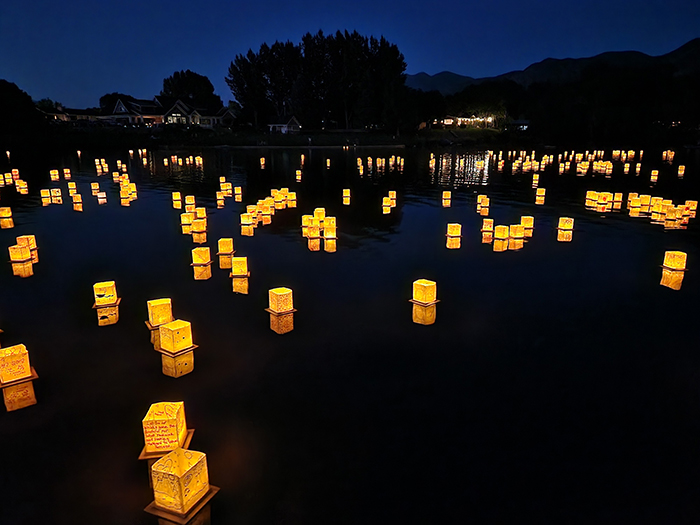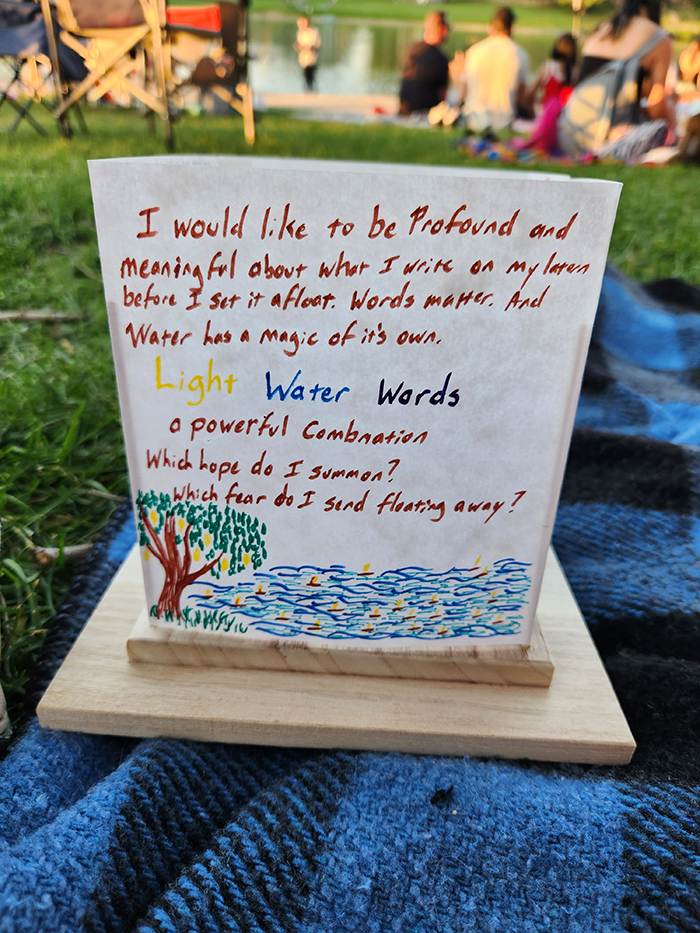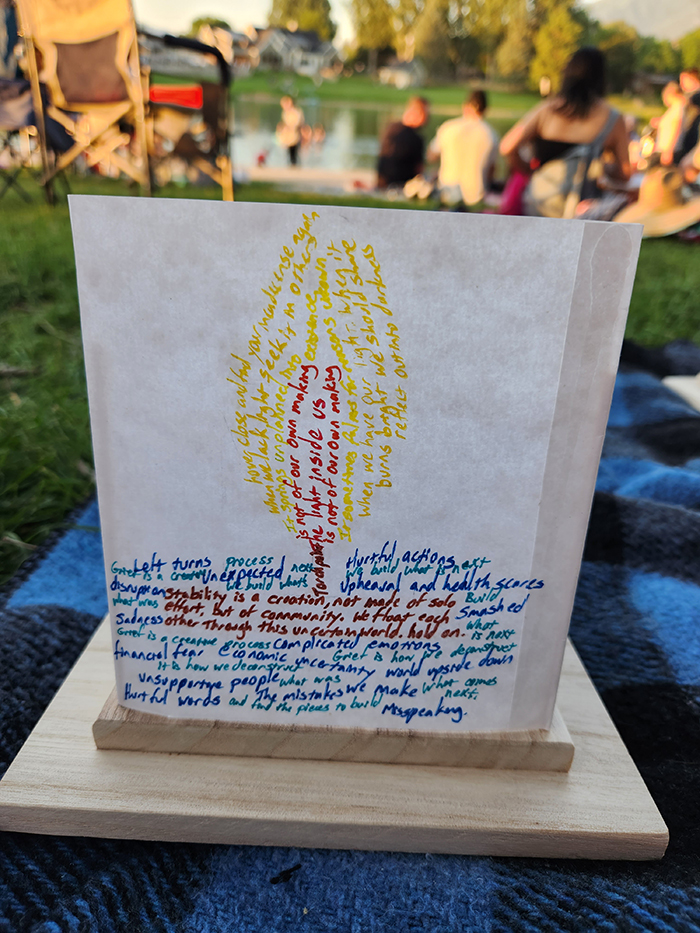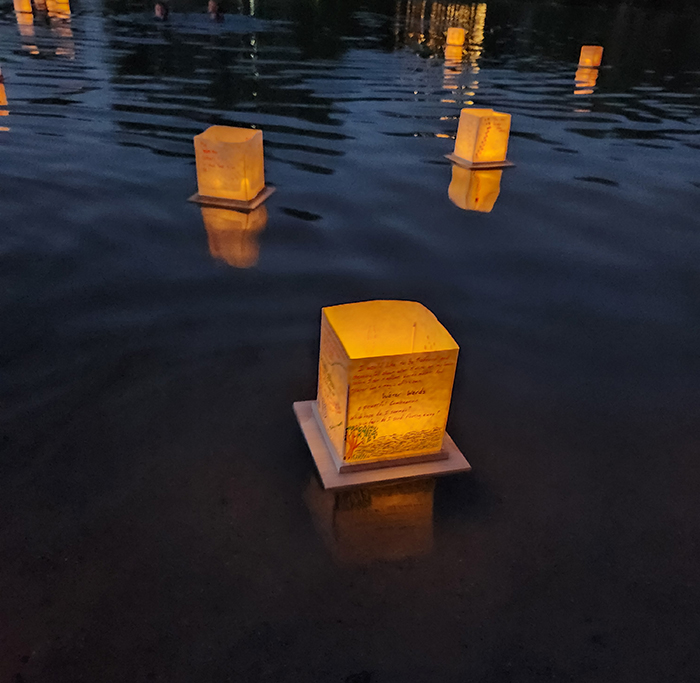Gen Con 2023
It is difficult to capture the complexity of my Gen Con experience in a single blog post. I wrote about some of the emotional arcs of it in my latest newsletter. I microblogged the road trip and collected that here in my prior post. Yet there is still something I’ve been trying to catch in words for weeks now. It is an amazement at how people will put so much love and stress and effort into creating an experience which requires the cooperation of others to also participate. Gen Con staff puts in so much work that would amount to nothing if the vendors did not show up to build their stores. The vendors put in so much work that would amount to nothing if the attendees didn’t show up to walk the floor and shop for wares. Each individual attendee also had their own logistics, planning, expenses, and challenges to come. And that doesn’t even begin to cover the people who run programming, the people who run games. The people who construct a giant balloon sculpture each year who must have spent months planning, calculating, purchasing, and staffing to make that happen.
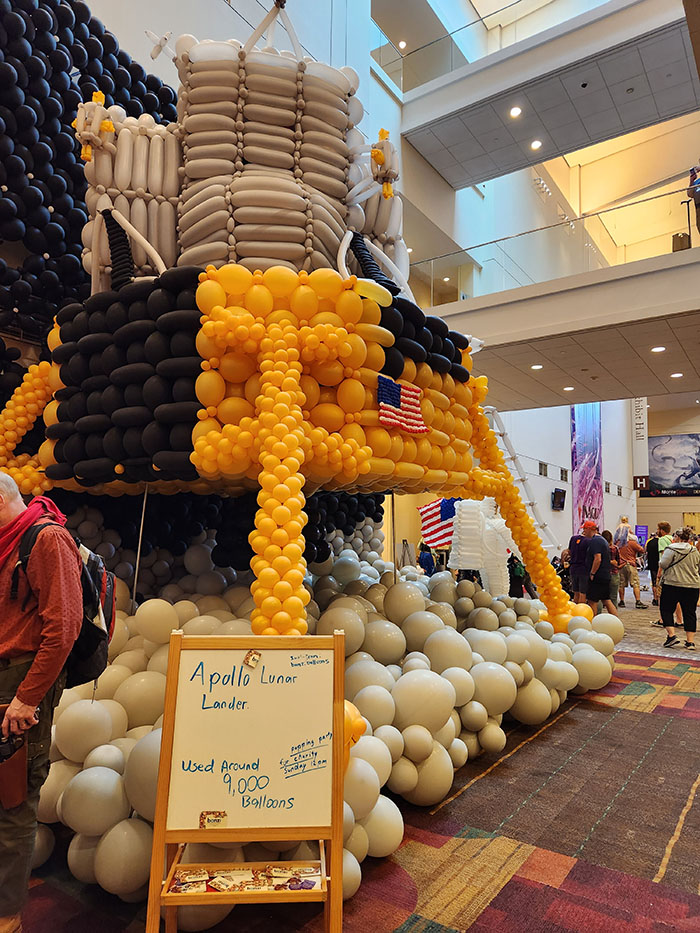
And then on Sunday afternoon they sell charity tickets to a popping party. All that effort turns into shared laughter, a pile of balloon shreds, and money for a good cause.
Gen Con is a community creation. It has to be. But then, so are our actual towns, our country, our writing groups, our families. All of these things depend on people showing up to cooperate or disagree, to negotiate over rules, to seek their own advantage, and to be stunningly altruistic in helping others. Humanity is beautiful and a Brigadoon-like event such as Gen Con helps me see that in such a joyful way.
We walk into the convention center to find an expanse of concrete.
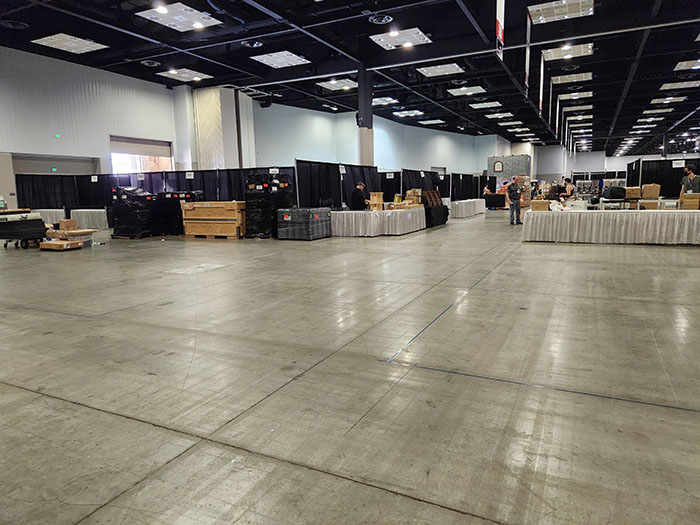
We find our individual space and then spend two days turning this:
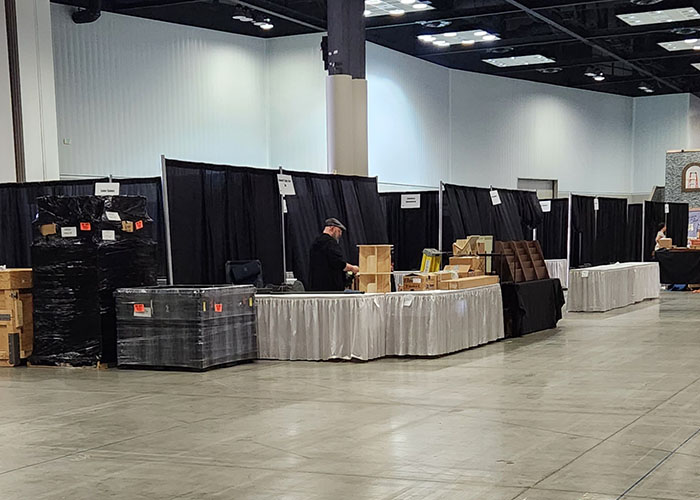
Into a miniature store that becomes our home for 4 days.
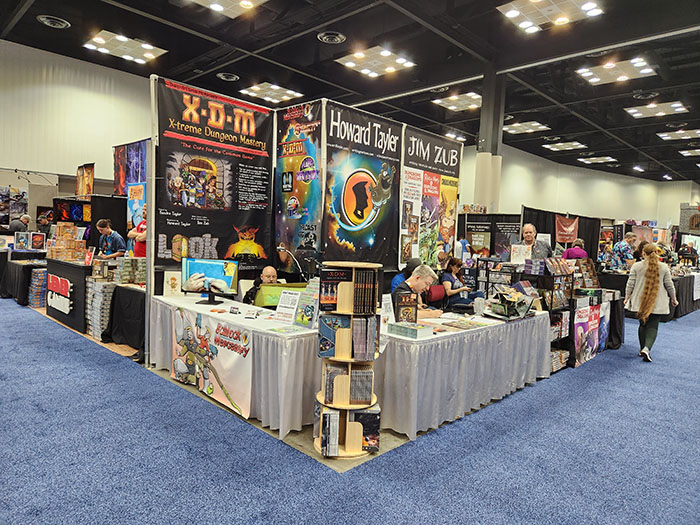
That small 10×20 space contains so much laughter and exhaustion. From here we talk with attendees. We shuffle our merchandise each morning, picking a sales focus for the day. We have a runner who brings us food. We have Jim, Howard, and Stacy as “the talent” who are the people that attendees come to see. We have sales staff who run the register and keep things stocked on the shelves. Like the rest of Gen Con, the roles aren’t rigid, we all pitch in where help is needed. We shuffle around for the hour when Tracy Hickman joined us in the booth. We re-shuffle to make adjustments to Howard’s drawing chair. By the end of the show we have a long list of things that went well and things we’d like to change for next year. This year’s big winners were that spinner at the corner of the booth which let people find the Schlock books they wanted and the closet space in the back where we could put all our stuff and occasionally go hide for a few minutes of down time. The big change is that we want to figure out how to build around Howard’s drawing chair so that he and Jim can sit next to each other instead of having Howard off to the back.
But we still got to have some joyful moments where Jim and Howard riffed off each other and laughed.
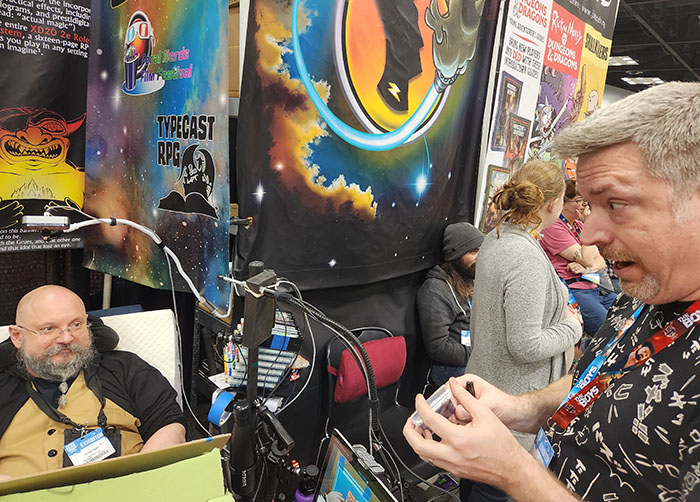
I particularly liked the moment where Jim pointed out that Howard’s reclined position meant he could eat food like a sea otter, with things just supported on his tummy. Howard leaned into the joke and Jim took video (which I haven’t yet gotten from Jim) But I did catch a photo of Howard pretending a pair of McDonald’s cheeseburgers were a rock and an oyster.
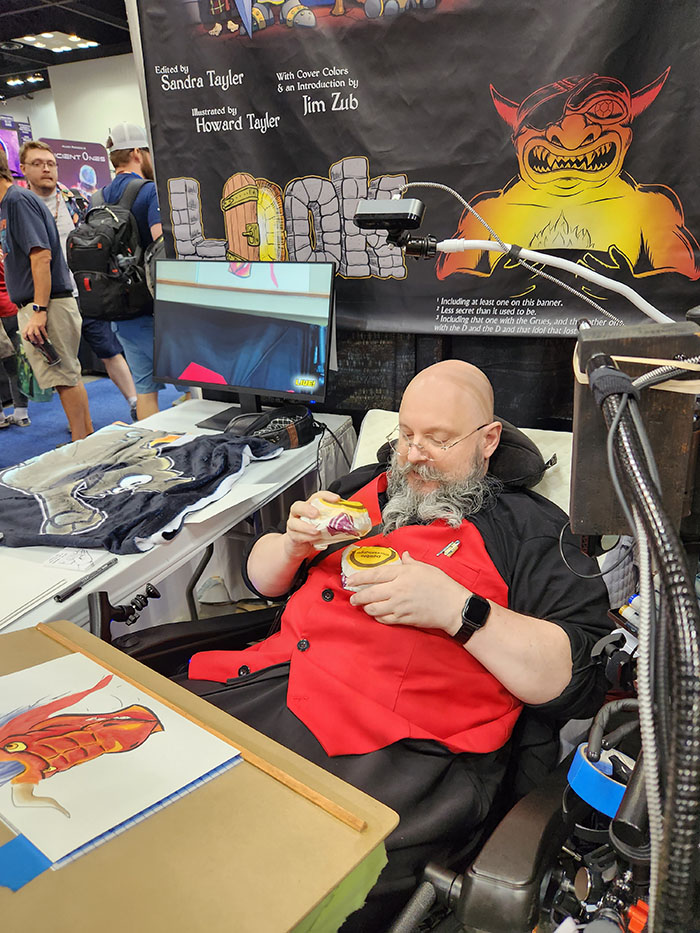
The chair, while at times awkward in the booth, really made a huge difference in Howard’s ability to manage the show. He would get into the chair and get energy back after the walk through the convention hall. We managed to set up a camera and monitor so that people could watch him draw. I love the moments when Howard’s drawings give people joy.
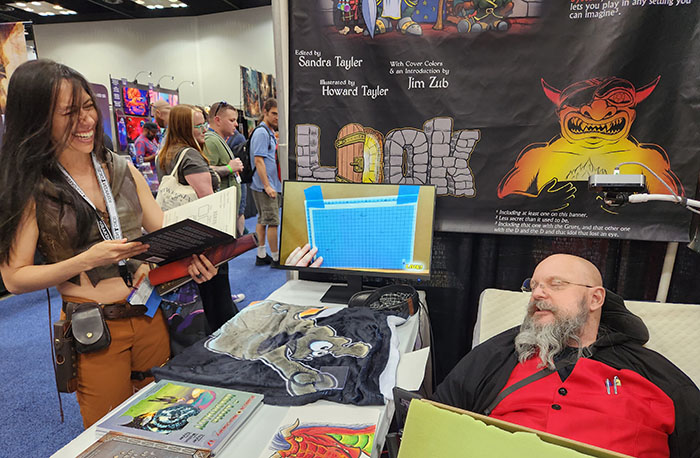
I don’t have any photos of the time I spent away from the booth at the Gen Con Writer’s Symposium. So that’s a note for next year: take more selfies with my writer friends when I get to see them. I got to re-connect with people I’ve known for a long time. I got to meet some new people. As usual, it was a little difficult to be split between booth and writer’s conference. I wanted to always be at the booth to help with Howard, sales, and lift the burden there. I also wanted to always be at the symposium, having more conversations with fellow writers both in the green room and in the hallways. I feel like I really stuck the landing on my Networking Despite Social Anxiety and Building Community Around Your Work presentations. The Marketing as Storytelling presentation needs some work still. Both of my panels were full of smart people with excellent things to say.
I do have a few photos of the hotel where we stayed, because it was a transformed train station. On the second floor there were actual train cars that have been turned into hotel rooms. We were glad to have a much more spacious room on the main floor, but it was fun to walk past the trains on our way to the convention center sky bridge.
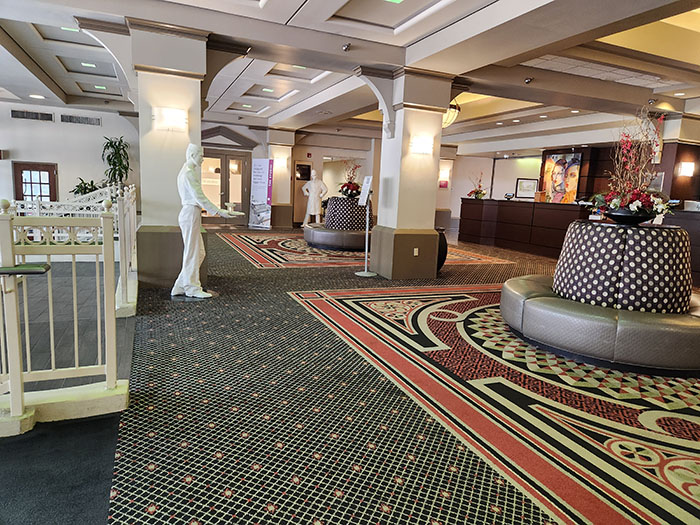
I failed to photograph the trains. Sadness. That is also I thing that always happens after conventions, getting home and realizing the portions of the event that I failed to capture. This hotel was a big win for us. It was the closest possible hotel to our booth. That was very helpful for not using up Howard’s limited energy on walking. He still arrived at the booth exhausted more often than not. But then reclining in the chair restored energy. A large portion of our stress and planning both before the show and during it, was trying to make sure that we didn’t over-tax Howard and cause him to crash. We also wanted to prevent a post-event crash that would keep him from working for weeks on end like last year. (Since I’m writing this more than a week after the show, I can tell you we succeeded! Yay!)
We also feel fairly good about our infection / safety protocols. We had several CO2 monitors and any time the numbers got over 1400ppm (Outside air is 400ppm, good indoor air ranges 400-800.) we would mask up. If numbers got over about 1800 we went elsewhere. Our booth had multiple air filters running and creating an air wall. In the dealer’s hall, even when completely packed, the numbers stayed below 1400. We masked through crowded hallways, and we came home uninfected as demonstrated by negative tests. I did hear some reports of infections, but this year I did not hear of many secondary infections. Last year the infection cloud continued to grow for more than a week post event (for all the events I tracked). This year the reports tend to be isolated to one or two people, most of whom can’t track exactly where their point of infection was. There were more masked people at Gen Con than I’ve seen anywhere else in the past year. Paying attention to all of this during the show was another layer of stress. But this is the world we live in, and Howard’s long covid has taught us caution, yet we still went to Gen Con. I should write a separate post about the safety vs. benefit math that goes into the decision to attend in person events. For our business and brains, Gen Con is a creative pillar, a huge supportive structure in the year and with the collapse of some social media, in person events gain a much larger importance. It is very much a Scylla and Charybdis situation. Pick your peril, try to navigate a safe path between.
At the end of the first day, it feels like the show will last forever. By mid-show we’re exhausted and sometimes counting the hours until it is done. Then suddenly it IS done. The lights go dim and it is time for us to take apart the store we built. The dealer hall that took two days to carefully construct is torn down and vanishes in mere hours. We’re back to bare concrete with pallets, packing cases, and the constant beep and roar of forklifts.
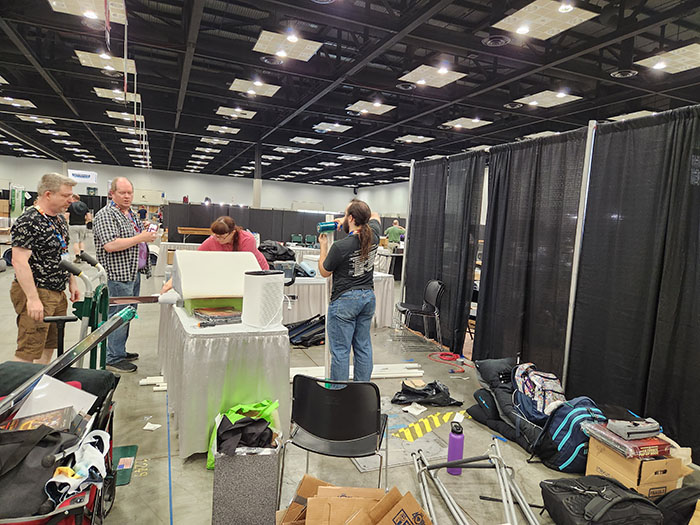
Sunday evening is full of farewells. We had the full crew dinner on Wednesday night with our extended Gen Con Family, current booth crew plus the people who crewed for us for ten years. I was so glad to see friends I hadn’t hugged since before the pandemic. Sunday evening was a smaller crew dinner, just the exhausted few who were staying at the hotel with us and all departing in the morning.
After the show, there were two very long days of driving. We did a lot less chattering during the drive home. And we did a lot more stopping because the four of us (Howard, me, our daughter, and son-in-law who booth crewed for us this year) all picked up Pokemon Go again. We scattered pokemon at gyms all down I-80.
After the driving there was the unpacking, and the remembering what normal life feels like, and the collapsing in a heap. Today, a full week after the final day of the show, I am beginning to feel more normal. Just in time to dive head first into launching a Kickstarter next week.
Gen Con was lovely. I’m still sorting thoughts, making notes, doing accounting, and planning ahead because we’ll do all of this again next year.
